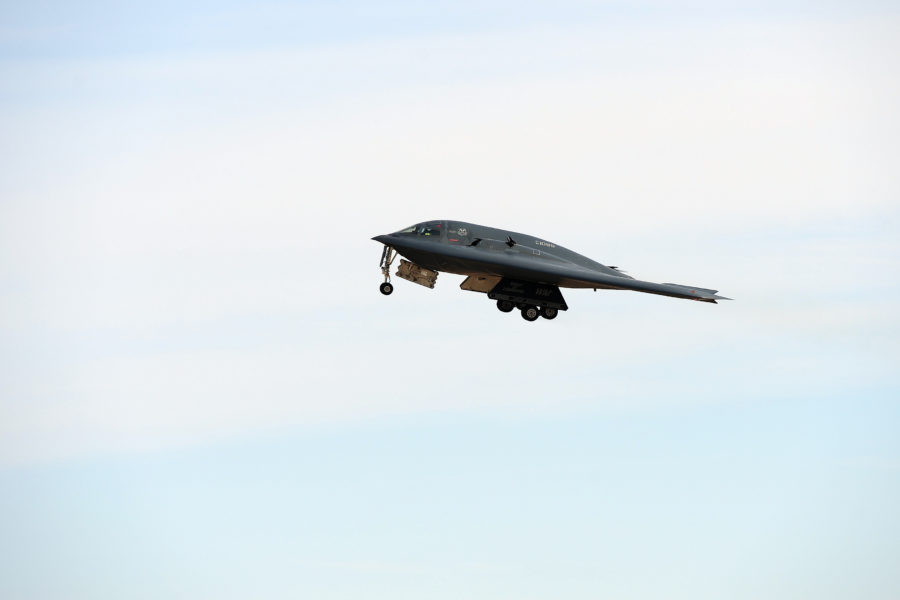The B-2 Spirit is returning to the skies, Air Force officials told Air & Space Forces Magazine. The first aircraft is projected to take off May 22 after a break in flying operations due to a safety pause.
The return to flight was recently approved by Air Force Global Strike Command boss Gen. Thomas A. Bussiere, after a roughly six-month safety pause following a mishap in December.
“The B-2 fleet safety pause is officially lifted,” Maj. Gen. Andrew J. Gebara, commander of the 8th Air Force, which controls the nation’s strategic bomber fleet, told Air & Space Forces Magazine. “Gen. Bussiere, at my recommendation, made a final determination on the necessary actions taken and approved a return to flight.”
Gebara and other Air Force officials declined to say what the safety issue was or what was done that allowed the service to resume flight operations.
“I wish that the safety pause was not necessary,” Gebara said. “But I think that it was really important that we find out what happened and make sure that was all mitigated before you start flying again, and that’s what we did.”
Gebara said there would not be onerous restrictions on missions.
“I want them to come back in a disciplined, deliberate manner,” Gebara said. “But we will do full operational missions. So you’re not going to see one loop around and land kind of sorties. It’ll be a normal sortie. I actually am not concerned at all about the mission aspects of the force.”
He said there would be a “phased approach” as the fleet returns to flight, with the most experienced pilots getting in the seat first and “several weeks to get the entire community back up to speed.”
But Gebara added a cautionary note to America’s adversaries: “That is distinct, though, from having enough pilots for whatever mission is required if there was a crisis.”
The Air Force declined to reveal the exact cause of the mishap, which temporarily blocked the lone runway at Whiteman Air Force Base, Mo. The service also declined to detail what actions were taken to lift the safety pause. The pause began in late December after a B-2 was damaged after an emergency landing December 10 at Whiteman—the only base to host combat B-2s, assigned to the 509th Bomb Wing and its Air National Guard associate, the 131st Bomb Wing.
Bussiere, a B-2 pilot and the former 509th Bomb Wing commander, took over AFGSC just days before the mishap.
Air Force officials said the aircraft remained ready to execute missions if needed, serving a critical role as the nation’s only stealth nuclear-capable bomber in service.
“The B-2 fleet could still fly missions if so required,” Gebara said. “Our ability to provide nuclear deterrence never stopped.”
B-2 pilots spent time during the safety pause in the advanced simulators at Whiteman and increased repetitions in T-38 trainers. Only 21 B-2s were produced, costing over $1 billion per plane, according to the Air Force. One was destroyed in a crash in 2008. Nineteen of the current airframes are at Whiteman—one of which is a test aircraft normally based at Edwards Air Force Base, Calif. One combat B-2 has been parked at Joint Base Pearl Harbor-Hickam, Hawaii, which shares runways with Daniel K. Inouye International Airport in Honolulu after the safety pause went into effect while the aircraft was at the base.
It is unclear what will happen to the B-2 damaged in December. The entire B-2 fleet will eventually be replaced by the B-21 Raider, which like the Spirit, is a stealthy flying wing produced by Northrop Grumman. The first B-21 is scheduled to fly later this year.
Air Force Global Strike Command has been conducting regular maintenance of all B-2s, and officials from the 509th Bomb Wing and Gebara said the stealth low-observable coating, which is critical for the B-2’s nuclear mission, was well taken care of.
“The way that the B-2 is we have a stair step approach to low observable maintenance,” Gebara said. “So a certain number of B-2s are fully low-observable ready to go.”
Despite a pause in operations, Gebara said America’s nuclear deterrence was not undermined.
“It’s hard to get inside the head of another country and figure out what they feel,” Gebara said. “I think it would not have been wise for them to doubt our deterrence, and I’m reasonably confident they don’t.”


